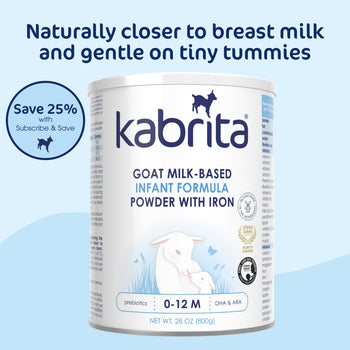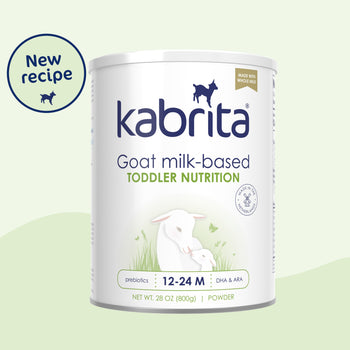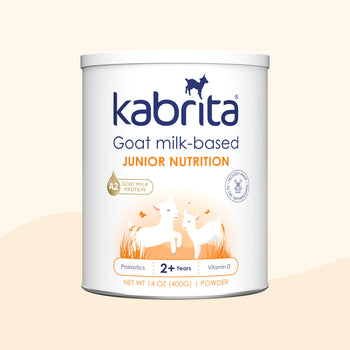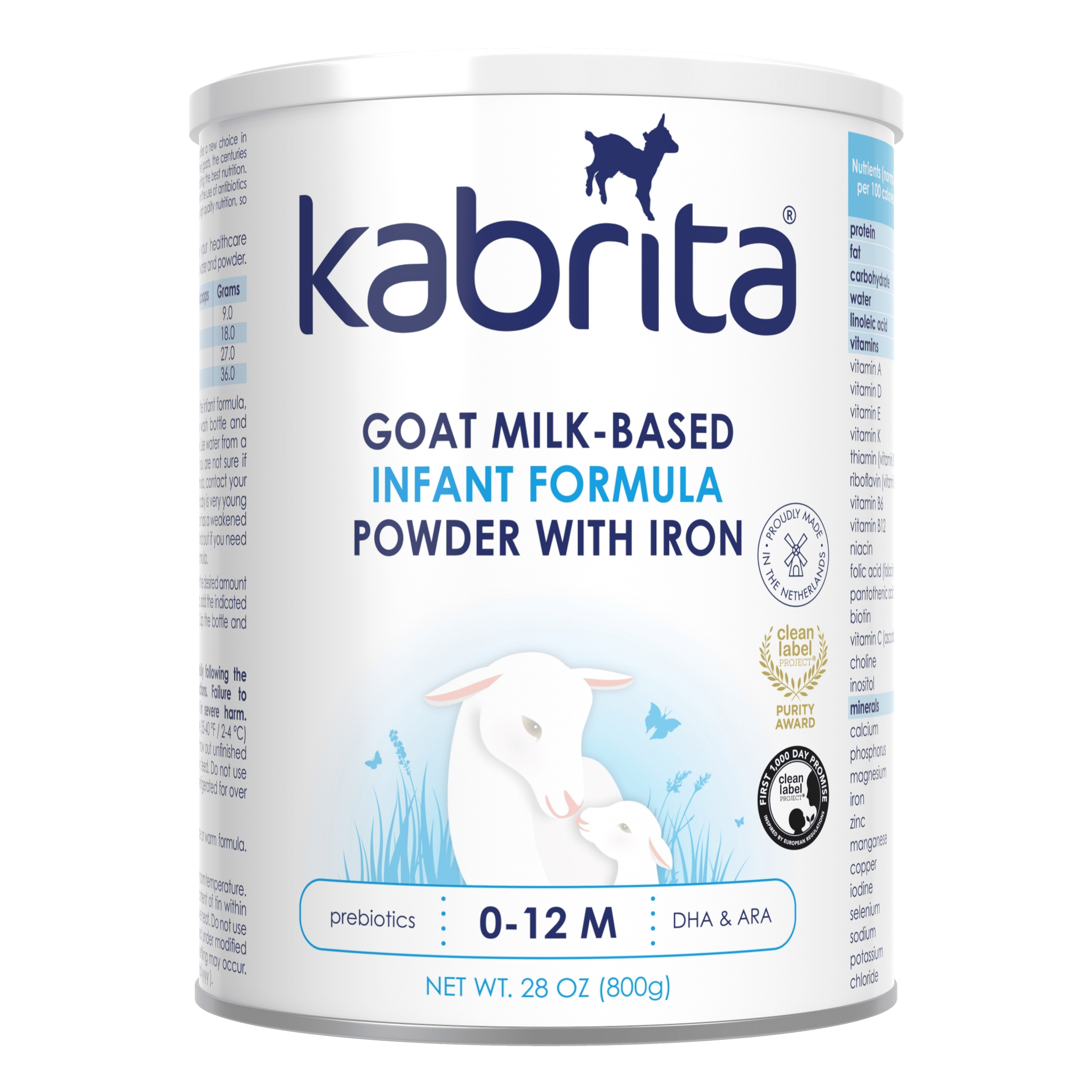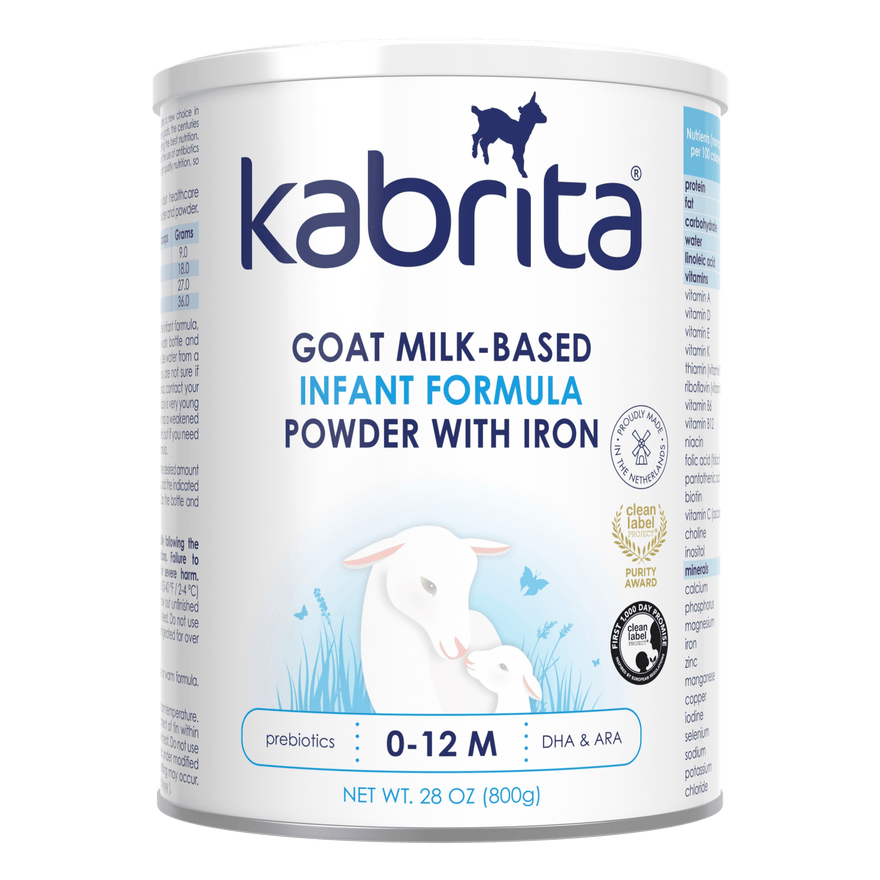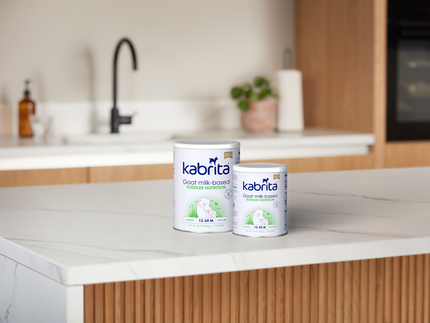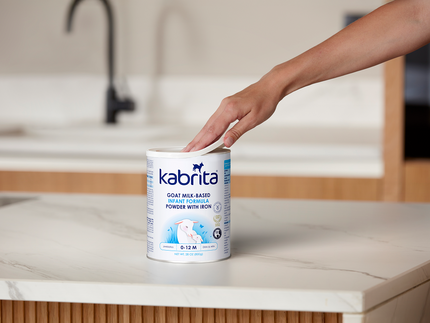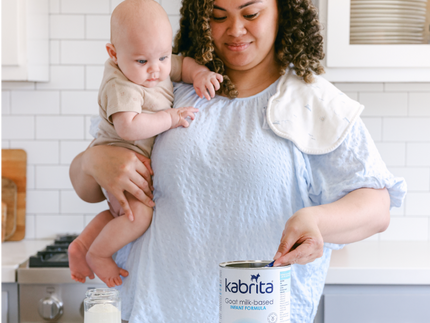
How to Know If Your Baby Needs Sensitive Formula
Crying, fussiness and spitting up seem to come with the territory when you have an infant, but when those symptoms start to seem more severe, it could be a sign that switching to a different formula may be worth a try. Your baby's brand-new digestive system is still developing—and sometimes, trying a formula that's easier to break down can make all the difference in your little one's comfort. Gentle infant formulas are designed to be easier on sensitive tummies to reduce painful gas and bloating.
How to know if your baby needs formula for sensitive stomachs? Here are the formula intolerance signs to watch for, plus tips on choosing the right formula for your baby and how to switch formulas safely.
Table of contents
What Is Sensitive Formula… And Why Might Your Baby Need It?
Signs Your Baby Might Need Gentle Formula
Choosing the Right Gentle Formula for Your Baby
How to Switch to a Gentle Formula
FAQs About Sensitive Stomach Formula and Infant Digestion
What is sensitive formula… and why might your baby need it?
First, it's worth breaking down the difference between a sensitive formula and a gentle formula. While all baby formulas legally sold in the US must meet strict nutritional requirements as dictated by the US Food and Drug Administration (FDA), sensitive formulas tend to feature reduced milk sugars (lactose), often substituting a different type of sugar. However, according to The American Academy of Pediatrics, it is extremely rare for babies to have a significant problem digesting and absorbing lactose, as lactose is the primary milk sugar in breast milk and is molecularly similar in cow milk, the traditional base for infant formula.
Check in with your child's pediatrician about whether a reduced-lactose formula is necessary for your baby. You may want to look instead for formulas that offer the right protein structure for your baby, which can impact the ease of digestibility.
Understanding gentle formula
Gentle formulas are generally derived from cow or goat milk—but differ from traditional infant formulas in several ways:
-
Proteins are smaller, and therefore easier to digest
-
Additional digestive aids like prebiotics may be included
-
Some contain different ratios of whey versus casein proteins to support easy digestion
Common reasons for switching to sensitive stomach formula
The most common reason for switching to gentle formula are symptoms of digestive discomfort in babies. "All babies under 6 months of age do their fair share of crying, spitting up, and passing gas," says Ari Brown, MD, FAAP. That can make it hard to know what's typical and what's a sign of an underlying issue. "But babies who spend several hours a day crying and have extreme difficulty settling, and/or who are constantly spitting up, and/or have constipation, and/or who have eczema should be evaluated by their pediatrician to discuss making a formula switch," Dr. Brown explains.
Signs your baby might need gentle formula
How to tell if baby is sensitive to formula? While some fussiness is normal, persistent symptoms might suggest your baby could benefit from a gentle formula. Dr Brown advises you keep track of the symptoms you notice and when they happen. Here are the key signs of intolerance to watch for:1
-
Baby seems uncomfortable after feedings
-
Inconsistent bowel movements
-
Extremely fussy and/or difficulty settling or staying asleep
-
Struggles with gas and bloating
If your little one is showing any of these signs, bring it up with your pediatrician right away. They can help determine if a formula switch is warranted—and recommend a gentle infant formula appropriate for your baby's specific needs.
Choosing the right gentle formula for your baby
Baby sensitive to formula? Here's what to know about choosing an infant formula that's easy to digest and well-tolerated.
What to look for in gentle formulas
When reading infant formula labels, the following features can indicate a formula is designed for sensitive tummies:
-
Partially hydrolyzed cow milk proteins (already partially broken down for easier digestion)
-
Goat milk proteins which are naturally smaller and softer than cow milk proteins
-
Added prebiotics and probiotics to support gut health
Goat milk-based infant formula as a gentle alternative
Goat milk-based infant formula has grown in popularity as an alternative to traditional cow milk-based infant formulas. "Some studies show goat milk-based infant formula is more tolerated or gentler than cow milk-based infant formula," says Dr. Brown. During the digestion process, goat milk forms softer curds in the stomach as compared to cow milk2 which can contribute to reduced gas and fussiness. Here are a few of the primary benefits of a goat milk-based formula.
Goat milk-based formula is naturally closer to breastmilk than cow milk-based formulas
-
Forms smaller, softer curds in the stomach
-
Naturally 5x more oligosaccharides (prebiotics) than cow milk
-
Lower levels of alpha-s1 casein, a protein (found predominantly in cow milk) that can be harder to digest4
Remember: The best infant formula choice depends on your baby's specific needs and symptoms. If you've got questions about switching to a gentle formula, always consult with your pediatrician first, and monitor your baby's response to any new formula carefully.
What to know about cow's milk protein allergy
For infants with diagnosed cow's milk protein allergy (CMPA), cow, goat milk and soy formulas are not recommended. CMPA is a relatively rare condition where babies have an allergic response to cow's milk proteins, and due to protein cross-reactivity between cow and goat milk, both types should be avoided. Because nearly half of babies with CMPA are also sensitive to soy protein, pediatricians typically recommend either of the following:
-
Extensively hydrolyzed infant formulas (also known as hypoallergenic or HA formulas), where proteins are broken down into smaller, less allergenic pieces.
-
Elemental or amino acid formulas, where the proteins have been completely broken down.
These specialized formulas provide complete nutrition while minimizing the risk of allergic reactions in sensitive infants.
CMPA is thought to affect just 3% of infants and most kids will outgrow CMPA by 1 year of age. “Many outgrow CMPA sooner,” says Dr Brown, “and can resume and tolerate cow or goat milk protein.”
What can be more common is when babies experience sensitivity or intolerance to cow's milk-based infant formulas, which differs from a true allergy. "The cow protein component called casein produces large and hard curds during the digestive process, making it more difficult to pass and leading to gas, bloating, discomfort, and sometimes constipation or diarrhea," says Dr. Brown. In these cases, a gentle formula may be helpful, or switching to a goat-milk based formula, which forms smaller, softer curds in the stomach.
But again, a reminder that if your infant is diagnosed with CMPA, a goat milk-based infant formula is not recommended. Instead, talk to your pediatrician about the best option.
How to switch to a gentle formula
"There really is not any formal transition here," advises Dr. Brown. "If a baby has trouble tolerating a particular product, it’s best to stop using it and move to a different product completely." You may have heard that it's helpful to slowly transition to a new formula, but Dr. Brown says there's no need. "I don’t suggest gradually phasing it into a baby’s diet," she explains. If your little one is having tummy trouble on their current formula, stop feeding that product right away and check for improved symptoms on the new formula.
Some changes are to be expected when switching formula. “Whether you are introducing formula to an exclusively breastfed baby or changing from one formula to another, you may notice a change in your baby’s stool frequency, color, and consistency and that’s okay!" says Dr. Brown. For more personalized guidance, reach out to your child's pediatrician.
FAQs about sensitive stomach formula and infant digestion
It's tough to know if tummy troubles in infants mean your baby needs sensitive formula. Here are answers to commonly asked questions.
Are sensitive infant formulas all pretty much the same?
Most sensitive formulas contain lower levels of the milk sugar lactose. Since carbohydrates are a critical source of nutrition for infants, these formulas need to replace the lactose with another source of carbohydrates. Some companies may use glucose solids or corn syrup solids, maltodextrin or another form of sugar. Check in with your child's pediatrician about whether a sensitive infant formula is necessary for your baby—in most cases, a gentle infant formula will be the more appropriate choice, given that true lactose intolerance is extremely rare in infants.
Can sensitive or gentle infant formula cause more gas?
Switching to any new infant formula can sometimes cause minor digestive changes, but these should last only a few days, if they occur at all. Gentle infant formula is designed to be easier on a baby's delicate digestive tract and features smaller proteins (either naturally smaller like goat milk proteins, or partially hydrolyzed cow milk proteins), and so they’re less likely to cause more gas or other digestive discomfort than traditional cow milk-based infant formula. If it seems like your infant is still having difficulty digesting their new formula, talk to your baby's pediatrician, who can recommend an option that may be better tolerated.
How do you know if you should use sensitive infant formulas?
Sensitive infant formulas feature lower levels of lactose, but the AAP doesn't usually recommend them, as most babies aren't lactose intolerant (lactose is the main ingredient in breast milk!). For babies who have trouble digesting formula, a gentle formula may be warranted, as it features smaller proteins that can make digestion easier. Goat-milk based infant formula is naturally closer to breast milk than cow milk-based infant formula5 and features smaller, softer proteins that are easier for tiny tummies to digest. Talk to your child's pediatrician about switching to a goat milk-based infant formula.
How do I know if infant formula is upsetting my baby?
How to know if infant formula is not agreeing with baby? Watch for the following signs of formula intolerance:1
-
Baby seems uncomfortable after feedings
-
Inconsistent bowel movements
-
Extremely fussy and/or difficulty settling or staying asleep
-
Struggles with gas and bloating
If you notice any of these symptoms in your formula-fed baby, bring it up with your pediatrician, who may be able to recommend an infant formula switch.
How to know if baby has a sensitive stomach?
All babies have digestive systems that are still developing, but some infants may have trouble with digestion (whether they're formula-fed or breastfed or a combination). If your baby seems uncomfortable after feedings, is having inconsistent bowel movements, is extremely fussy or has difficulty settling or staying asleep and struggles with gas and bloating, they could be having trouble digesting their food. Keep track of the symptoms you notice and whether they happen in relation to feeding times, and share the information with your pediatrician.
How to tell if baby has formula intolerance?
Formula intolerance is marked by certain physical and behavioral signs that seem to indicate your infant is having trouble digesting their current formula. If your formula-fed baby seems uncomfortable after formula feedings, is having inconsistent bowel movements, has a lot of gas or a bloated tummy, cries intensely for hours or has extreme difficulty settling, it could be related to formula intolerance. Your next best step is to speak with your baby's pediatrician about making a formula switch.
A note on how to know if your baby needs sensitive infant formula
Infant formula is designed to help your baby grow and thrive—but if your infant is having tummy troubles on their current formula, it's worth talking to your pediatrician about finding a different option. All babies can have periods of fussiness, spitting up and gas, but if your baby's symptoms seem consistent and generally tied to feeding times, it could be a sign that they're having difficulty digesting their food. Most infant formulas are made from cow milk, but some studies show that goat milk-based infant formula is better tolerated by infants, and naturally more similar to breastmilk than cow milk-based infant formula. With smaller, softer curds and a protein profile that is closer to breastmilk than cow milk-based infant formula, goat milk-based infant formula is a naturally gentle option for little bellies.
References
- Bajerova K, Salvatore S, Dupont C, et al. The Cow's Milk-Related Symptom Score (CoMiSS™): A Useful Awareness Tool. Nutrients. 2022;14(10):2059. Published 2022 May 14. doi:10.3390/nu14102059
- Park Y, et al. Physico-chemical characteristics of goat and sheep milk. Small Ruminant Res. 2007;68(1): 88-113.
- Attaie R, Richter R. Size distribution of fat globules in goat milk. Journal of Dairy Science. 2000;83(5), 940-944. 10.3168/jds.S0022-0302(00)74957-5
- Ceballos LS, et al. Composition of goat and cow milk produced under similar conditions and analyzed by identical methodology. J Food Composition Analysis. 2009;22(4):322-329.
- Maathuis A, et al. Protein digestion and quality of goat and cow milk infant formula and human milk under simulated infant conditions. J Pediatr Gastroenterol Nutr. 2017;65(6):661-666.

